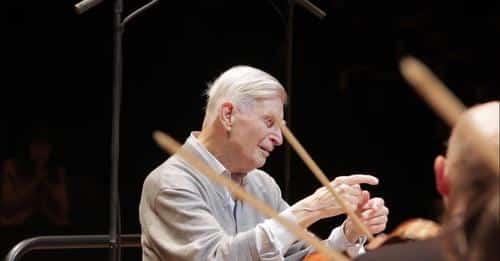Why is this German maestro receiving a London honour?
mainI am struggling to understand why the Royal Academy of Music has elected Christian Thielemann to an honorary membership (see citation here).
Thiely has hardly worked in London since the mid-90s when he fell out badly with the orchestra in the Royal Opera House. He has shown no apparent concern for the education and welfare of its musicians – the role of the RAM – and has played no role in any of the critical issues facing music in the UK.
So why give him an honour? Someone, please, explain.






Credit for talent and genius know no boundaries. Honor is an open welcome door,
Typical response of the naive Euro musician worshiper. When man has no belief in God, he is willing to fill that void with any kind of form of worship. The worship of musicians (whose fame comes only through clever manipulation of marketing and the media, not true artistry) is truly sickening.
The citation emphasizes the Thielemann’s strengths. To me it feels about right, aside from the frequent references to Karajan . Maybe I fail to read between the lines, but they seem to honor Thielemann for becoming the foremost exponent of German romantic music (I believe he is) and for growing into his success through hard work and faith in traditional values. If honorary membership to RAM is an equivalent to an honorary doctorate, I think Thielemann richly deserves it.
But what purpose does this honor serve? Does there have to be a connection to british music life and education? Who are previous RAM honorees?
the HonRAM is a fairly general sort of award, suitable for recognition of diverse accomplishments. Here is a list of current honorary members of the RAM.
https://docs.google.com/viewer?a=v&q=cache:quIB9o-rRsAJ:www.ram.ac.uk/viewfile.cfm%3Fid%3D81%26h%3D9333E395443BBCBC9A8EB5B8BA51F7FD63EDB35B7EB5419ABABC60085C521C18+HonRAM&hl=en&gl=us&pid=bl&srcid=ADGEEShqeInqYMsCSCmZHMMbVq_nmaozwUgsHNFN7g-E25y5fDih1REM6_5g8GIX4mXLJT56zdzkn2HaiLU_wo3jKUpj4wWIskKAxIkr-q9bjwyIvlSEkxuo0Jk5qTXRtR6yLEU9jjU7&sig=AHIEtbTQTOnhSC10aqe-YgfGYes0Esh9vQ
I am horrified and embarrassed to see that the RAM has appointed this odious maestro an hon RAM. I sang in his performances of Palestrina at the ROH and without a doubt it was the most unpleasant experience of my entire musical life. Had the RAM actually got round to sending me my FRAM certifcate in 1988 I would now be returning it to them.
David, I would be interested to know why you found the experience so unpleasant. I have lived in Germany for the last 30 years. The way Thielemann has championed a new kind of German nationalism in music has raised a few eyebrows. In general, Germany has been an exemplary model since WWII, so I think the nationalism will remain within proper bounds, even if it awakens still painful memories.
On the other hand, Thielemann has made some very unfortunate comments. When Barenboim was considering resigning his position as GMD of the Deutsche Oper in Berlin, Thielemann said, “”Jetzt hat die Juderei in Berlin ein Ende.”
The sentence is almost impossible to translate because the word Juderei is a pun on the German word Schweinerei. Schweinerei derives from the word for pig (Schwein,) and means something that is dirty, annoying, or morally repugnant. By replacing the word pig with Jew, the word Juderei is formed. The best translation in English might be, “And now the Jew-piggishness in Berlin is coming to an end.” Or maybe, “And now the Jew mess in Berlin is coming to an end.” There is no exact translation.
The Berlin politician, Wolfgang Girnus, was in a meeting with several other high cultural officials in Bayreuth (of all places!) when Thielemann made the remark. Girnus reported the remark. Thielemann denied he said it and took Girnus to court. Thielemann lost. Among other things, Girnus’ lawyer noted that several other witnesses could be provided who were in the meeting. The judge also noted that reports about the comment were already widespread in Berlin.
German musical nationalism is one thing, probably even a positive development if kept in proportion, but when combined with anti-Semitic remarks it becomes problematic.
You can read about the court case in German here:
http://www.berliner-zeitung.de/newsticker/christian-thielemann-scheitert-mit-seiner-klage-gegen-wolfgang-girnus-wer-sagte–juderei–,10917074,9913312.html
Anyway, why was your experience unpleasant?
Dear William,
no wonder he is such a great star at Bayreuth:-(( (Despite pleasant recent developments you have plenty of Nazis strolling around there during the Festspiele.
I always found his way of conducting overrated. Such a comment among artists is just disgusting.
Maybe it was because of envy! Barenboim was (and stil is) conducting Wagner much better than Thielemann. The Kupfer Ring and the Müller Tristan with Waltraud Maier – that are achievements subject to honour!
Looking forward to Petrenkos Ring…
Thomas
Thomas, I agree.
I made an error in my comment above about Thielemann’s remarks about the Berlin “Juderei.” The politician Wolfgang Girnus wasn’t in the meeting at Bayreuth where Thielemann made the remark. Girnus only reported it after it had become well-known in Berlin and the story repeated by many prominent people. Some of the newspapers suggested that Thielemann chose to attack Girnus because he is a representative for the German Communist Party and would thus make an easier target.
you should get your facts straight before contributing to more defamation. Thielemann is not anti-Semitic. I have never heard anything of the sort come out of his mouth.
The Berliner Morgenpost article presents no evidence that Thielemann made indeed the infamous remark. Rumors are rumors, not facts.
On the other hand, Girnus’ lawyer pointed the court to several witnesses that would confirm the statement was made.
Juderei has noting to do with Schweinerei, get your German straight. This is nonsense. we use the ending -rei for all sorts.
I have always found Thielemann’s conducting vastly overrated. Regarding the comment concerning Barenboim, I was not aware that the term “Juderei” would conjure up an association with “Schweinerei” for a native German speaker, which I am not. If so, it is even more offensive than it would appear to be at first glance, given that the association of Jews with pigs was a standard trope of German antisemitism for centuries, continuing through the Third Reich (check out “Judensau” on Wikipedia for an explanation).
Thomas Pegelow Kaplan’s book, _The Language of Nazi Genocide – Linguistic Violence and the Struggle of Germans of Jewish Ancestry_ (Cambridge University Press) documents that Juderei is a wordplay with the word Sauerei. As Kaplan puts it, “Judereien” also was a German-language word play on “pig’s mess” (Sauereien), which reminded readers of “Jewish pig” (Judensau), a popular late medieval anti-Judaic image.”
See:
http://www.cambridge.org/aus/catalogue/catalogue.asp?isbn=9781107650572&ss=exc
There has been some discussion in this blog about the relationship between politics and music. Thielemann might be an interesting study in this regard. Below is a translation of an article that quotes a review of Thielemann’s Meistersinger in the Neue Zürcher Zeitung. The quote and commentary appeared in “der Freitag,” June 22, 2001:
“In the Neue Zürcher Zeitung, music critic Peter Hagmann published an article in which he sharply criticizes Thielemann’s Meistersinger performance: ‘Should this music be played with such an undisguised militarism? Should artistic expression so directly arouse instincts that can so quickly veer out of control? Generations of musicians since the end of World War II have dealt with the problem of how a work should sound that emanates from questionable ideological premises… Christan Thielemann sets all this aside with a single stroke of the hand. With the arrogance of the young, he awakens ghosts that had seemed banished.’ Thielemann was vigorously defended against this criticism by the Junge Freiheit, the newspaper for rightwing intellectuals.”
The German original:
“In der Neuen Zürcher Zeitung schrieb der Musikkritiker Peter Hagmann einen Artikel, in dem er sich mit Thielemanns Meistersinger-Aufführung scharf auseinander setzte: ‘Darf diese Musik so unverstellt militaristisch gespielt werden? Dürfen durch Kunst so direkte Instinkte geweckt werden, die nur zu rasch außer Kontrolle geraten? Generationen von Musikern haben sich seit dem Ende des Zweiten Weltkriegs mit dem Problem auseinander gesetzt, wie ein Werk, das von fragwürdigen ideologischen Prämissen ausgeht, weiter klingen könnte … Christan Thielemann setzt das alles mit einer einzigen Handbewegung außer Kraft. Mit der Arroganz des Spätgeborenen weckt er Geister, die gebannt schienen.’ Heftig verteidigt wurde Thielemann gegen diese Kritik ausgerechnet von der Jungen Freiheit, der Zeitung für rechte Intellektuelle.”
I’m guessing they awarded it to him because they need him on their list of “names” of the headed note-paper and he is elevated (to some degree or other I imagine) by being an honorary academician. Mutual scratchy-backy. Don;t forget that von Karajan was made a doctor of music by Oxford (I think – am I right Norman?) many decades after he ceased to perform here at-all really. Late 70’s perhaps?
He became Dr HvK (Oxon) at the suggestion of the serving PM, Edward Heath